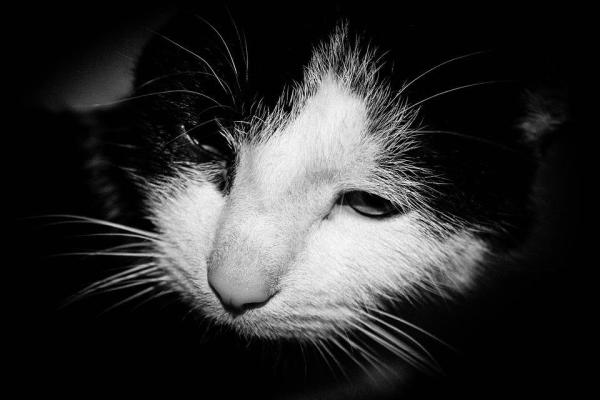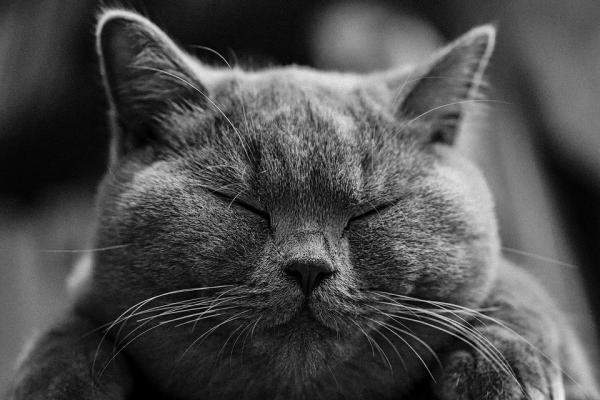
Death is a natural process experienced by all living things. At times it can be difficult to perceive, especially in cats. As you may already know, cats show little signs of pain or disease.
If you suspect that your cat may be dying, we recommend reading these 5 symptoms that a cat is going to die, but of course it will also be very important to go to the vet as soon as possible. They will be able to give them as much of a dignified end as possible. Keep reading this AnimalWised article to learn more about how to know that your cat is dying.
1. Their personality begins to change
Access to health, complete nutrition and good care greatly increases the longevity of our cats. Nowadays we can find many felines that reach up to 17 and even 20 years of age. Therefore, it is not surprising that diseases that previously were not perceived by owners appear, such as senile dementia in cats.
An obvious symptom of our furry friend getting older is the onset of behavioral disorders, usually related to their health status. It is common to see that they are irritable, is experiencing unusual urination or is depressed. Although these signs do not exclusively indicate that a cat is going to die, they do signal that something unusual is taking place.

2. They don't clean themselves
The loss of hygienic habits in a cat is a clear sign that something is wrong with your cat. Although it is true that some cats spend more time than others on personal grooming, the total loss of this behavior indicates some type of problem.
In this section, it is also important to include the neglect of other normal practices and/or habits, such as when they stop marking their scratching post or rubbing furniture with their bodies.
3. Their vital signs are altered
The symptoms of a dying cat also include alterations in their vital signs. Abnormal heart rhythms, excessively high or low body temperature, and disturbed breathing are common.
Here are the vital signs of a healthy cat [1] :
- Respiratory rate in cats: between 20 and 42 breaths per minute (RPM).
- Heart rate in cats: between 140 and 200 beats per minute (PPM).
- Body temperature: between 38ºC (100.4F) and 39ºC (102.2F).
- Capillary refill time: pressure should be applied to the mucous membranes to see how long it takes to recover their normal color, for example the mucous membranes of the mouth. The capillary refill time of a cat should be less than two seconds.
If you notice any alteration of the vital signs of the feline you must go immediately to a veterinary center immediately, since it implies that the life of the animal is compromised.

4. They stop eating and health problems arise
As mentioned above, it is not always easy to identify the symptoms of a sick cat. However, diarrhea, seizures, vomiting, blood in the urine or seeing our cat stop feeding or ingesting liquids, may be a sign a cat is dying. If your cat does not accept food, especially if it is their favorite food, you may be facing a stage in your cat's death.
5. They hide or retreat
A cat that is hiding or retreating is a common sign of sickness in cats. Cats that are sick often feel more vulnerable and are therefore more scared. Additionally, like a sick cat, an animal near death will feel the same vulnerability. Consequently it is not surprising that many dying cats seek an isolated place to die. If you notice that your feline is taking shelter somewhere and doesn't want to leave the space, it may be a sign that they are dying.

What to do if a cat is dying
When faced when any of these signs, it is best to consult your veterinarian straight away. A professional is the only person capable of diagnosing your animal and informing you at what dying cat stage your feline is finding itself.
A specialist will guide you on what decision to take. It is important to understand that if your animal is suffering a lot and experiencing excessive pain, it is sometimes advisable to consider euthanasia. This is a act taken in order to stop the animal from suffering unnecessarily.
A veterinarian can also help and guide you by informing you about the the best care that your cat needs during its dying cat stage. You may need to help your cat: feed, drink or defecate. And naturally, it is imperative that you offer your cat as much love and care as possible during this difficult period.

What to do when a cat dies
The death of an animal is always a very painful process. However, sometimes, in the midst of this whirlwind of emotions, you must consider what to do with their body.
If your cat has died at the vet, the specialist will likely suggest that you incinerate its body in the same center, either with other animals or privately. However, if your cat has died at home, you can go to the vet or contact an animal funeral home directly, which is generally considered a cheaper option. If you wish, you can also choose to bury their body in a place that you prefer, however, this property must be private and laws regarding burials must be complied with.
Do not forget that if your cat is on your country's pet register, you must inform them to remove the name. This is necessary to ensure that the census is up to date.
As we have mentioned before, the death of a loved one is incredibly painful, even if it is an animal. Therefore, you should not feel guilty or embarrassed if you need to spend time mourning or speak to a specialist.
Do not forget that if at any other point you find yourself prepared to have another cat in your home, we suggest considering adoption. We recommend going to an animal shelter and offering your home to an abandoned animal. By adopting an abandoned animal, you give it an opportunity at a new life, full of love, that it otherwise might never have received.

This article is purely informative. AnimalWised does not have the authority to prescribe any veterinary treatment or create a diagnosis. We invite you to take your pet to the veterinarian if they are suffering from any condition or pain.
If you want to read similar articles to How to Tell if Your Cat is Dying - Symptoms & Advice, we recommend you visit our Other health problems category.
- Tami Gabriella, Veterinarian and Ethologist, Vital Constants in Cats, Affinity 2016